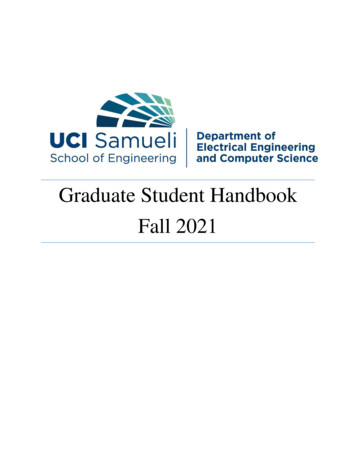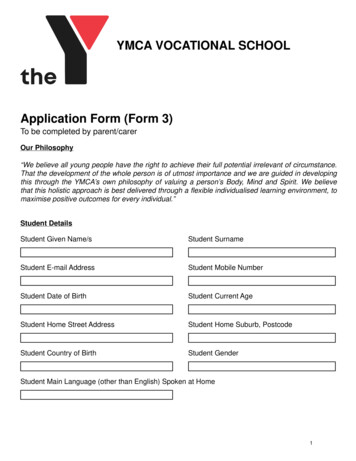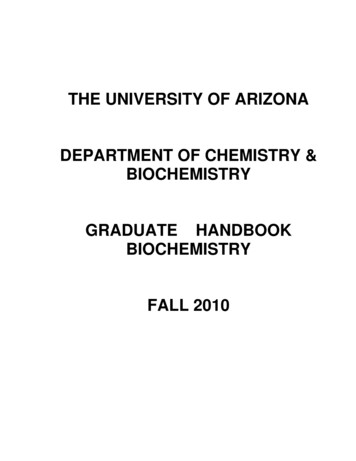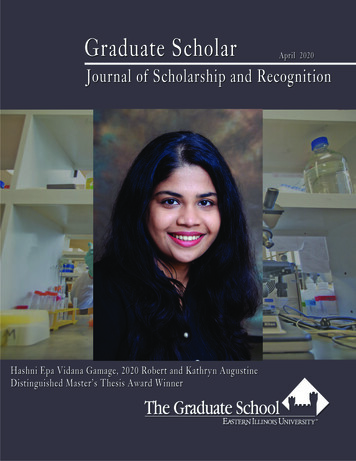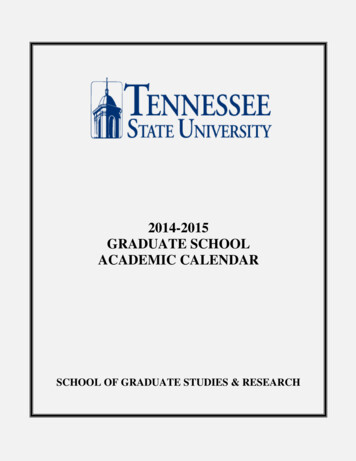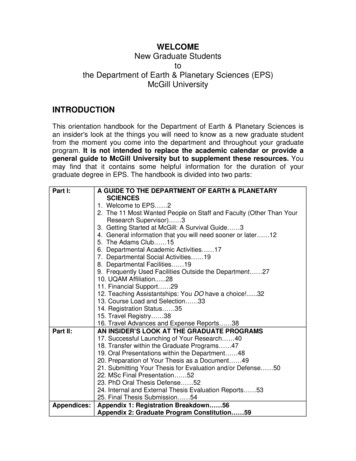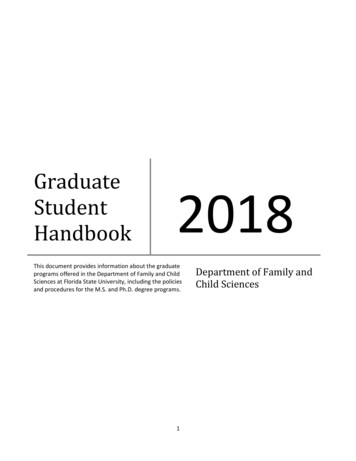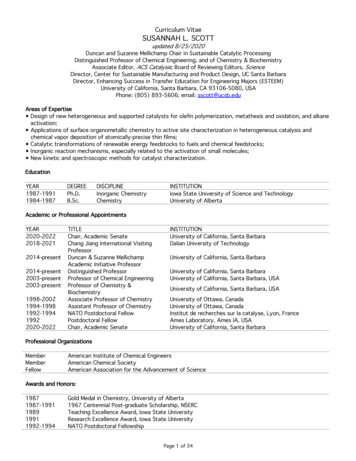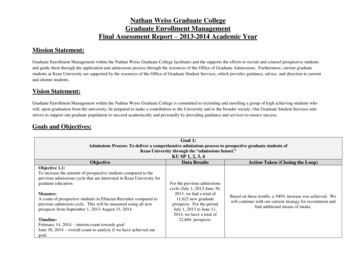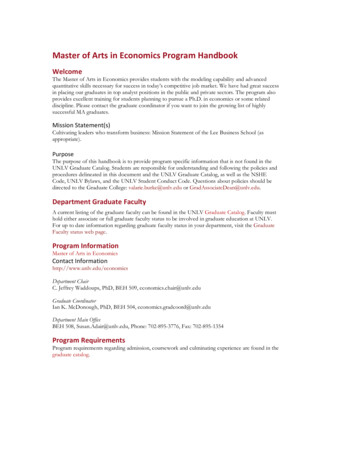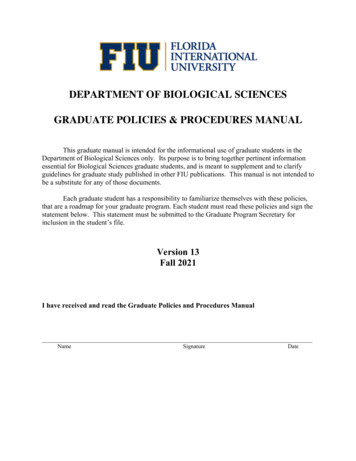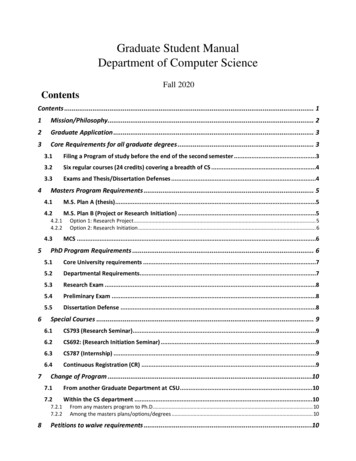
Transcription
Graduate Student ManualDepartment of Computer ScienceFall 2020ContentsContents . 11Mission/Philosophy . 22Graduate Application . 33Core Requirements for all graduate degrees . 343.1Filing a Program of study before the end of the second semester .33.2Six regular courses (24 credits) covering a breadth of CS .43.3Exams and Thesis/Dissertation Defenses .4Masters Program Requirements . 54.1M.S. Plan A (thesis) .54.2M.S. Plan B (Project or Research Initiation) .54.2.14.2.24.3567MCS .6PhD Program Requirements . 65.1Core University requirements .75.2Departmental Requirements.75.3Research Exam .85.4Preliminary Exam .85.5Dissertation Defense .8Special Courses . 96.1CS793 (Research Seminar).96.2CS692: (Research Initiation Seminar) .96.3CS787 (Internship) .96.4Continuous Registration (CR) .9Change of Program .107.1From another Graduate Department at CSU. 107.2Within the CS department . 107.2.17.2.28Option 1: Research Project . 5Option 2: Research Initiation . 6From any masters program to Ph.D. . 10Among the masters plans/options/degrees . 10Petitions to waive requirements .10
9Satisfactory Academic Progress .119.1Graduate School Expectations .119.2Maintaining good academic Standing . 119.2.19.2.29.2.39.2.49.2.59.2.6Academic Probation . 11Appeals Procedure . 11Department Expectations . 11Expected Progress (Ph.D.) . 12Expected Progress (MS, Plan A) . 12Expected Progress (Part-time) . 139.3Other Requirements . 139.4Finding/Changing an Advisor .1310Department Evaluations and Their Implications .1310.1Assistantships: Quality of Work. 1310.2Annual Evaluation . 1410.3Dismissal Procedures . 1410.4Ethical and Professional Conduct . 1410.5Discrimination Statement . 1410.6Grievance Policies. 1511Assistantships .1511.1Graduate Teaching Assistants GTA . 1511.2Graduate Research Assistants (GRA) . 1511.3GSA . 1511.4External Funding. 1511.5GTA Selection . 1611.6Residency Requirements . 1612Logistics .1612.1Registering for Classes . 1612.2Student representation and governance (GSA) . 1612.3Department committees . 171Mission/PhilosophyThe mission of the Computer Science Department at Colorado State University is to provide the bestpossible undergraduate and graduate education in computer science, to conduct high quality research, and todisseminate knowledge through graduate education and outreach programs. Graduate students play manyimportant roles in this mission. As students, they receive graduate education. As teaching assistants, theyinstruct and mentor undergraduates. As researchers, they create new knowledge to advance the field.The purpose of this manual is to assist graduate students in succeeding in the department of computer science
at CSU. It covers many aspects of the graduate student process, including degree requirements, fundingmechanisms, department expectations, and more. This manual may not answer all your questions; however, itshould answer many of them, and provide links to online documents that may provide additional answers. Forquestions not answered by this manual, students should consult with the Director of Graduate Advising, TheGraduate Program Director, or their research advisor (if they have one).The program requirements listed here are over and beyond those described in the University’s GraduateBulletin, which specifies the minimum requirements for all graduate degrees at CSU.2Graduate ApplicationStudents applying to a graduate program in the CS department need to be admitted both by the departmentand by the graduate school of the university. Therefore, the admission process has two steps: a departmentalreview (to be completed first), and a university application (to be completed if and when the departmentapproves). The process for new graduate students, and in other departments at CSU is described on thedepartment’s grad application web site.1 For students who are already in the department, the process isdescribed in Sec. 7.2.3Core Requirements for all graduate degreesWe first list core requirements common to all the graduate programs in the department. All regular courses2used to satisfy (the core as well as other) degree requirements must use conventional grading (no S/U/auditgrading options allowed).3.1Filing a Program of study before the end of the second semesterStudents must file a Program of Study (form GS-6) with the graduate school by the end of the secondsemester in the program. This is one semester earlier than the graduate school deadline. The GS-6 is anofficial form and identifies three important elements of graduate study: the advisor, the committee and atentative list of courses that the student plans to take.Advisor and Committee The advisor is the chief mentor in a graduate student’s education. This individualworks closely with the student throughout the graduate career on all matters related to the degree program.Students select their advisor by mutual consent, as a mentor-mentee relationship develops through courses,department seminars, and 1-on-1 discussions.Each student also has an individual graduate advisory committee, whose members are chosen by the studenton the basis of their interests, experience with faculty members, and the advisor’s suggestions.The committee is individualized to each student, except for MCS and MS Plan B option 2 (ResearchInitiation) students, for whom, the faculty advisor and committee (if needed) is assigned by default.Plan of coursework The GS-6 also lists all courses that the student plans to take. They must conform to theUniversity and Department degree requirements. Transfer credits if approved (and up to the university limitfor transfer credits), are also reported on the GS-6 form. The GS-6 form is started on the students RAMWebaccount after consultations with the advisor.See graduates/csgradapply.php.The CSU catalog defines a regular course as one whose last two digits are strictly less than 82. In the CS department,the non-regular courses are independent or group study, graduate seminar, research seminar, internship, thesis anddissertation.12
Deviations from the plan, if any occur during the course of study, are reported on the graduation application(GS-25) submitted in the graduation term. The modified plan must still satisfy all the degree requirements.3.2Six regular courses (24 credits) covering a breadth of CSAll students must take at least six regular graduate courses in the Computer Science department (4 credithours each, total 24 credit hours). No more than two of them may be at the 400 level. No course below the400 level may count towards the degree requirements.To ensure adequate breadth of studies in multiple foundational areas, the above six courses must include atleast three courses from the list below, with one course (4 credit hours each, for 12 total) from each of thefollowing three groups:Group I (AI & Theory): CS510 (Image Computation) CS520 (Analysis of Algorithms) CS522 (Foundations of Cyber-Physical Systems) CS540 (Artificial Intelligence) CS545 (Machine Learning) CS548 (Bioinformatics Algorithms)Group II (Systems): CS530 (Fault Tolerant Computing) CS535 (Big Data) CS553 (Compilers for High-Performance Program Generation) CS555 (Distributed Systems) CS557 (Advanced Networking) CS560 (Foundations of Fine-Grain Parallelism) CS570 (Advanced Computer Architecture) CS575 (Parallel Processing)Group III (Software Engineering & Information Assurance): CS514 (Software Product and Process Evaluation) CS515 (Software Maintenance and Evolution) CS517 (Software Specification and Design) CS518 (Distributed Software System Development) CS533 (Database Management Systems) CS556 (Computer Security) CS559: (Quantitative Security) CS567: (3D User Interfaces)3.3Exams and Thesis/Dissertation DefensesThe Ph.D. and the Plan A MS require students to defend a final thesis and/or dissertation, and someintermediate exams. These exams are all public and follow a common format. Moreover, thethesis/dissertation defense is both a formal examination, and an occasion to celebrate the culmination astudent’s graduate journey. These exams usually have the following format.The student makes an oral presentation of the thesis and the main results. Members of the audience andcommittee members ask questions of the student. The public is asked to leave, and the committee privatelyasks questions to the student. The student is asked to leave and the committee deliberates and decides the
outcome of the defense.At the conclusion of the thesis defense, the GS-24 (Report of Final Examination) is filled out, signed by thecommittee and given to the student3Scheduling defenses and exams: All defenses and Ph.D. exams in the Computer Sciencedepartment are open to the public, and therefore must be announced well in advance. This requiresinforming the Director of Graduate Advising staff at least two weeks in advance of the proposeddefense. The final draft of the document must be provided to committee members at least two weeksin before the defense.4Masters Program RequirementsThe department offers MS and the MCS (coursework) degrees. Students choose one of Plan A (thesis), PlanB (with two options: Project or Research Initiation). This section describes their requirements.4.1M.S. Plan A (thesis)The MS Plan-A requires 37 credits beyond the bachelor’s degree, and the preparation and defense of a thesis.It is a traditional research masters in computer science, which includes course work, research and a thesis.This degree is the preferred preparation for those who intend to go on to earn a Ph.D. Note that some of therequirements for this degree cannot be satisfied through online courses.Additional Coursework In addition to the 24 credits of the core (see Sec. 3.2), the Plan-A masters requiresthe following 13 credits of additional coursework.1. Two (2) credit hours of CS692 to be taken in the first two semesters (1 credit each).2. Four (4) credits of CS793 (Research Seminar) taken for a letter grade (S/U/audit grading is notallowed) and supervised by the student’s thesis advisor.3. Three to seven (3-7) credit hours of CS699 (Thesis). If fewer than 7 credits are taken, theremainder may be satisfied, in consultation with the advisor, by another 500 level (or higher) coursewithin or outside the department.Thesis: The thesis is a written formal document which addresses, in an original fashion, some importantconcern of the discipline. It involves significant independent work, performed under the supervision of theadvisor. Usually, the preliminary work begins during the CS793, and the defense is in the following semester.Although some theses lead to results publishable in peer reviewed venues, this is not a requirement.4.2M.S. Plan B (Project or Research Initiation)The MS Plan-B requires 36 credits beyond the bachelor’s degree, and either a research project (option 1) orexposure to research (option 2). Note that some of the requirements for this degree cannot be satisfiedthrough online courses.4.2.1Option 1: Research ProjectIn addition to the 24 credits of the core (see Sec. 3.2) the Plan-B option 1 masters requires the following 123For the complete list of the required forms, please follow the Graduate School guidelines.
credits of additional coursework.1. One additional regular graduate course (4 credit hours) in the CS department (at the 500 or higherlevel)2. Two (2) credit hours of CS692 to be taken in the first two semesters (1 credit each).3. Six (6) credits of CSxx (Research Project) supervised by the student’s project advisor.Project and Final Exam The student must perform a research project under the supervision of a facultyadvisor. The specific work for the project is determined by mutual discussion, and will involve tackling aproblem deeper than in a regular course, typically over the course of two semesters. At the conclusion of theproject, the results are publicly presented to department in the form of a poster. This poster session constitutesthe final exam for the project.4.2.2Option 2: Research InitiationThis option requires no project, but more courses, and an initiation to research by (i) taking CS692 in thefirst semester, and (ii) developing active and ongoing awareness of department research. This happensthrough participation in activities like BMAC seminars, thesis and dissertation defenses, poster sessions forstudents in the project option and CS793, and public exams of Ph.D. and MS (Plan A) students. The finalexam consists of critical audience participation in the project poster session in their final semester.Specifically, in addition to the 24 credits of the core (see Section 3) the Research Initiation masters requiresthe following 12 credits of additional coursework.1. Two additional regular graduate courses (8 credit hours total) in the CS department (at the 500 orhigher level)2. One (1) credit hour of CS692 to be taken in the first semester.3. Three (3) flexible credits that may be satisfied through any (500 level or higher) course in the CSdepartment, except internship (CS787).4.3MCSThe Master of Computer Science degree is a non-thesis, non-research, professional masters consistingexclusively of course work. It is offered both on-campus and online. No exams or research projects, beyondthose required in courses, are required, nor may any non-regular courses be counted towards the degreerequirements. In addition to the core 24 credits (see Sec 3.1.2), three (3) additional regular CS courses at the500 level or higher are required. The Graduate Program Director serves as the de facto advisor for all MCSstudents, no additional committee members are needed.5PhD Program RequirementsThe program requirements listed are here are over and beyond those described in the University’s GraduateBulletin, which serve as the minimum requirements for all graduate degrees at CSU. All regular courses usedto satisfy the degree requirements must use conventional grading (no S/U/audit grading options allowed).The PhD is a traditional research doctorate involving course work, original research and a dissertation.Students seeking the Ph.D. should be ready to perform original research in computer science upon entrance tothe program.Entrance Requirements: Students applying to the PhD program should have demonstrated re- search potentialin a research area of one or more members of the CSU computer science faculty. Ways to demonstrate
research ability include undergraduate research projects, published or posted writings, volunteer positionsespecially related to STEM, leadership positions at school or work, published extensions of class projects,etc. Ph.D. admission is highly competitive; only the most highly qualified applicants are admitted to theprogram. We do not conditionally admit PhD students.5.1Core University requirementsThe grad school specifies the following regulations for the Ph.D. program: Course work must include a minimum of 72 credit hours beyond the Bachelor of Science degree(includes thesis credits). A minimum of 32 credit hours must be earned at Colorado State University (includesthesis/dissertation credits) after formal admission. At least 62 must be earned at CSU for studentsentering without a masters degree. A Master of Science degree from an accredited college or University may be accepted for up to 30credit hours.5.2Departmental RequirementsAll Ph.D. students must satisfy the core requirements: finding an advisor, forming a committee and filing aProgram of Study in the first two semesters, and completing 24 credits of regular courses satisfying thebreadth requirement (see Sec 3). In addition, the Ph.D. requires the following additional coursework.1. Exactly two (2) credit hours of CS692 (Research Initiation Seminar) to be taken during the firsttwo semesters at CSU.2. Three (3) credit hours (500 level or higher) outside of the CS department (courses crosslisted with the CS department are not considered outside courses).3. At least 8 credits of CS793, or 8 regular credit hours at the 600 level within the CS department(see restrictions below).Restrictions: Courses that are cross-listed in the CS department cannot be counted toward requirement 2 (outsidecourse). All out of department courses applied toward Departmental Requirements must be approved by thegraduate committee. Students must petition for such waivers in writing. Grades of B or better can be used to satisfy Ph.D. requirements. Grades below B cannot be used tosatisfy any of the requirements above.Additional Requirements (milestones): Research Exam: Each Ph.D. student is required to take the written and oral Research Examination.This examination tests the student on critical thinking skills, background knowledge, and researchsynthesis (see below). Preliminary Exam/Advancement to Candidacy/Proposal Defense: Each Ph.D. student isrequired to take the oral Preliminary Examination (see below). This exam centers on, but is notlimited to, the student’s proposal for dissertation research. Passing this examination admits thestudent to Ph.D. candidacy.
Dissertation and Defense: The final examination (see below) of a Ph.D. candidate is the defense ofthe dissertation and related subject areas. Regulations concerning the format and conduct of thefinal examination are contained in the Colorado State University Graduate Bulletin.These exams are all open to the public and must follow the timely announcement described in Sec 35.3Research ExamThe Research Examination is intended to be a strong predictor of success in Ph.D. research. The student willmeet with his/her advisor to develop a topic and prepare an initial bibliography for the exam. The student willprepare a written report on the selected topic, including a critical review of related literature. The student willalso have an oral exam, based on the written report.A detailed description of the PhD Research Examination can be found on the CS Department web site (underthe “Degrees” menu). Students prepared to take the Research Examination can find an MS Word version ofthe exam request form on the CS Department website. This form should be completed and returned to thedepartment secretary. The form used by faculty to evaluate Research Exam performance is available is alsoavailable on the CS Department website.A student who fails the research exam may take it a second time. The second try should come in the nextsemester (not including summer). A student who fails the research exam for the second time is dismissedfrom the department.5.4Preliminary ExamFollowing successful completion of the Research Examination, each student will prepare a dissertationproposal and take the Preliminary Examination. Passing this examination admits the student to Ph.D.candidacy. The dissertation proposal should be prepared in close consultation with the student's advisor, andshould be available to all committee members at least one week prior to the examination. It should reflect anextensive critical literature survey, and contain an accurate assessment of the state-of-the-art in the area ofresearch, a precise statement of the problem to be solved, motivation for pursuing the research, and evidenceto the effect that there is a good likelihood the problem is solvable with reasonable effort.Successful completion of the Preliminary Examination results in agreement between the student and thecommittee as to what will constitute successful completion of the dissertation research. The committee maychoose to reconvene the examination to allow the student to further research the problem, complete additionalcourse work, or revise the dissertation proposal document.Graduate School regulations governs the Preliminary Examination. The GS Form 16 is used to report theexamination results to the Graduate School. Failure to successfully complete the examination on the secondattempt mandates dismissal from the program.5.5Dissertation DefenseThe dissertation defense must be held in accordance with the Graduate School deadlines. At least one monthbefore the final examination, the advisor will inform the student and the committee members of the natureand scope of the examination. The student must notify the Department at least two weeks prior to the Defenseto ensure that the Defense is publicly announced so that all interested faculty and graduate students mayattend.Candidates who fail their Defense of Dissertation may present themselves, with permission of the
committee, for one additional reexamination not earlier than two months, nor later than twelve months, afterthe date of the failure.6Special CoursesThe department offers a number of non-regular (special courses).6.1CS793 (Research Seminar)CS793 is a research seminar in which graduate students work one-on-one with faculty members to conductresearch in specific areas of computer science. Students will conduct independent research on a topic chosenin consultation with the instructing faculty member, learning research methods and producing a peerreviewed paper and research poster to be presented at a symposium at the end of the semester. Papers will bereviewed before presentation by at least two other individuals chosen in consultation with the student'sinstructor, and a panel of faculty will provide input on the research presented at the research symposium.In each semester, the research groups participating in CS 793 are listed on the course website along with thefaculty responsible in each case. Students enrolled in CS 793 must take responsibility for contacting one ofthese groups and then following the specific instructions offered. All Plan A MS and PhD students must takeCS793 as part of their degree program (see Sections 4.1 and 5.1).6.2CS692: (Research Initiation Seminar)[This section to be updated based on upcoming changes to CS692]The Department of Computer Science, in cooperation with ISTeC (Information Science and TechnologyCenter), offers the CS Colloquium series as a service to all who are interested in computer science. Thecolloquium series is also offered as a 1 credit class, CS692 (sometimes called BMAC, for historical reasons).All MS and PhD students must take CS692 as part of their degree program (see Sections 3.2 and 4.1).6.3CS787 (Internship)CS787 is a one-credit course commonly used in conjunction with international students seeking workexperience in the US off-campus, under the Curricular Practical Training (CPT) Program. The conditions forobtaining CPT permission are strict (see https://isss.colostate.edu/). The most common way to fulfill CPTconditions is to enroll in a credit bearing course. The CPT process is initiated by the student who arrangeswith an employer to obtain a written offer of employment (describing the work that will be done). Thestudent gets a CPT form from the International Student Scholar Services office (Laurel Hall), and has theform completed by her/his advisor. The Computer Science Department requires a form outlining theeducational goals of the work experience. This can be obtained from the Faculty Advisor or the GraduateProgram Director. Once completed, a student is given permission to add CS787.CS787 may, under appropriate circumstances, be used by domestic students.CS787 is not allowed to be included in the Program of Study for a Computer Science degree.6.4Continuous Registration (CR)Continuous Registration is a special status for which graduate students may register in place of creditbearing courses any semester they are attending Colorado State University, in order to remain admitted to andaffiliated with the University. Continuous Registration gives the students access to the library, laboratory,campus computer services, etc. Continuous Registration does not bear credits. For more information, contact
the Graduate School47Change of ProgramChanging programs after enrollment at CSU is accomplished by completion of the Graduate School form GS7, which is availabl
The mission of the Computer Science Department at Colorado State University is to provide the best possible undergraduate and graduate education in computer science, to conduct high quality research, and to disseminate knowledge through graduate education and outreach programs. Graduate students play many important roles in this mission.
